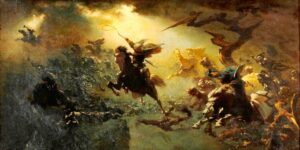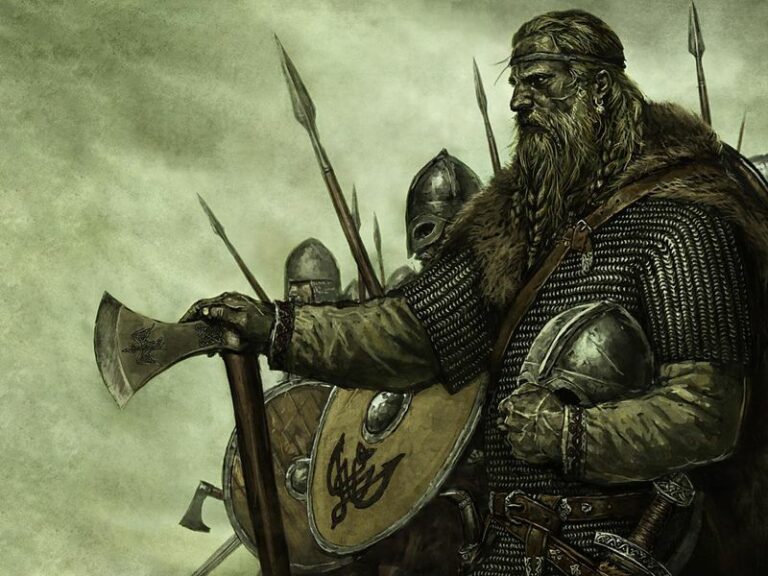
“If you need a Viking Names Generator – then you’ve found it! We constantly update our generator’s knowledge base, ensuring that you receive a completely unique name for your character. Enjoy!”
The old Nordic language was once spoken only amongst the inhabitants of the northern Scandinavian peninsula. Since they are situated on land encircled by vast amounts of seawater, they became expert fishermen and seafarers. Over two centuries passed, these sea people learned warfare, becoming adept warriors and sea raiders feared across northern Europe.
Did you know? The term Norsemen or Nord, or Norse roughly translates as “North” in the English language. Therefore, we are directly calling their group “Northern Men”
We became accustomed to calling the Nordic people Vikings. Surprisingly, this word does not refer to them as a civilization or a group, but rather as a title to describe them. The word Viking sourced its meaning from the old Norse word vikingr, meaning “pirate” or “raider”. Because of the vast expansionism and invasive nature of the so-called Vikings, their influence, culture, and language quickly spread in Europe.


We’ve seen Marvel cinematic shows regarding ancient Viking mythology for their storyline. Names like Thor, Odin, and Loki are derived directly from Norse mythology and are now associated with our favorite comic heroes today.
Moving backward in time, how do we have a glimpse of how Vikings created their names?
The way of creating Viking names is no different from other ancient civilizations. Names are based on the things around them such as nature, disasters, time, inanimate objects, or even attitudes or personalities. A few examples of widely used old Norse names are Astrid, meaning beautiful; Erik, meaning ruler; and Sigrid, a Viking girl name associated with being a horsewoman.
As you can observe, Viking names may have gender distinctions. Although there might be names that can be used for both males and females such as Njal (/nee-yal/) meaning, giant. Surnames are not as important as their blades. Nords do not have surnames but rather use the patronymic system wherein children, especially male Viking names, are drawn after their fathers.
In the following section, you’ll get to know Viking names that you didn’t know were derived from old Norse names.
Don’t be surprised, but this name came directly from the Nordic language which means “to burn”. The name “Brenna” is one of the favorite name picks for female babies in the early 2000s
Believe it or not, the name Liv came from the mutated Norse word hlif (/li-fv/) which means “cover” or “protection”. Liv is a rare and uncommon name, having only around a few thousand times used between 1979 to 2018.
“Tyra” has no direct meaning in the old Scandinavian language. It is hypothesized to be referenced from Thor, the god of thunder, or an alternative persona for Thor as his female version. Nevertheless, the name Tyra is a common choice of name among female black Americans.
This old Norse name has been used for more than five centuries already. It has been around and used since the medieval era, the dark ages, and the age of exploration. Mostly used by high personalities or wealthy families, Erika is considered one of the most common female names that have a Viking origin. Erika is the feminine translation of the word Erik and entails the same meaning: a ruler.
Kirk is a common name choice for most male babies in Europe, the USA, and a few parts of Southeast Asia. It is also one of the common Scottish, Danish, and English surnames. Kirk came from the old English word cirice which transformed into kirkja in old Norse. Cirice and kirkja both translate as “church” in the modern English language.
One of the rarely used names around, Leif is an indirect transformation from the old Nordic word leifa, meaning “to leave” or “to abandon”. While this name might have a negative meaning, this Viking name may also mean “heir” “heritage”, or “something to pass on”.
Olen is a gender-neutral name that can be given to any child. It is directly derived from the old Norse language which means “relic”. Other versions of the word “relic” vary to every Scandinavian origin. Some may refer to a relic as leifr, which is somehow related to something that can be left as an inheritance to a person.
Osborn is a result of multiple transitions from the different Scandinavian region dialects. Depending on its Scandinavian origin, it may be spelled as Asbjorn, Asbiorn, or Osbiorn. This directly translates as “god-bear”, wherein As or Os refers to “a god”, and bjorn a bear. Osborn has many variations such as Osborne, Osbourn, and Osbourne. The name is originally common in Normandy (a place named specifically for the “Normans” or Nords) and spread throughout Britain and the USA.
Create Old Nordic or Viking Name Character using our Viking Name Generator. It’s absolutely free!
The culture and traditions of the ancient Norsemen were nothing but crumbles of history in the modern era. But their language is passed on to generations and generations of tribes, groups, and countries. Their influence, despite their presence being short-lived, became well-known and well-adopted by the rapidly transforming kingdoms in the 11th century AD.
To this day, we are embraced by a diverse pool of names coming from different cultures and countries. Nordic names, on the other hand, are still common now to the point that it is hard to spot if the name has Nordic roots in the first place.
Below are some of the common names that you are aware of having Viking origins.
Arlan – meaning “a stranger” or “alien”. Also translated as “old” in the Gaelic language.
Axel – meaning “a father of peace”, or “peaceful creature”
Bjorn – meaning “a bear”
Dagmar – meaning “famous” or “popular”. A common surname in Scandinavian countries.
Frieda – softly translates as “peace” in old Norse.
Gertrude – meaning “strength”. This is a common Viking name used in video games. Most likely related to a female character in-game.
Halley – Another common English name derived from the old Norse heall, meaning “large space”. This also has spelling transitions such as Hailey, or Hailie.
Harold – this name is somehow associated with “power” or “might”. This is a common German word in modern times but still has its grassroots in the old English and old Norse language.
